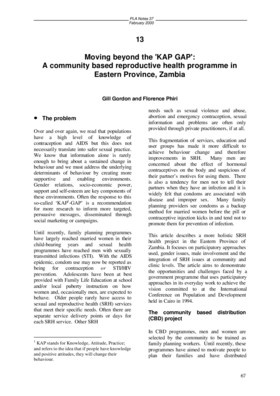PLA Notes 37 February 2000 13 Moving beyond the 'KAP GAP': A community based reproductive health programme in Eastern Province, Zambia

Document begins: PLA Notes 37 February 2000 13 Moving beyond the 'KAP GAP': A community based reproductive health programme in Eastern Province, Zambia Gill Gordon and Florence Phiri needs such as sexual violence and abuse, The problem abortion and emergency contraception, sexual information and problems are often only Over and over again, we read that populations provided through private practitioners, if at all. have a high level of knowledge of contraception and AIDS but this does not This fragmentation of services, education and user groups has made it more difficult to necessarily translate into safer sexual practice. achieve behaviour change and therefore We know that information alone is rarely improvements in SRH. Many men are enough to bring about a sustained change in behaviour and we must address the underlying concerned about the effect of hormonal determinants of behaviour by creating more contraceptives on the body and suspicious of supportive and enabling environments. their partner's motives for using them. There Gender relations, socio-economic power, is also a tendency for men not to tell their partners when they have an infection and it is support and self-esteem are key components of widely felt that condoms are associated with these environments. Often ...
Cite this publication
Available at https://www.iied.org/g01868